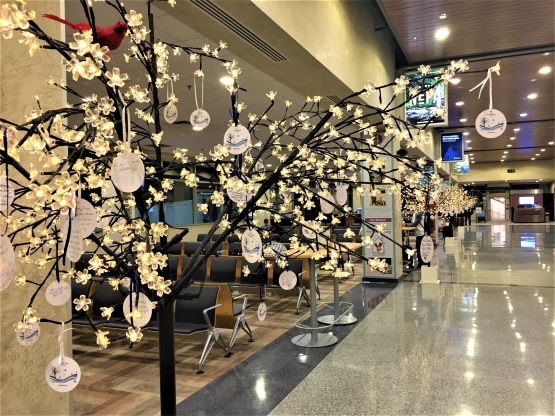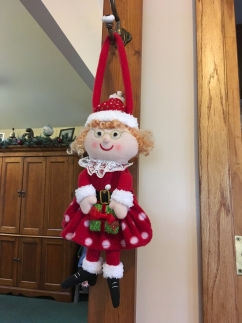| The Wishing Trees
|
|
| Thursday, January 31, 2019 | |
Wilkes-Barre/Scranton International airport. You’re familiar with it, aren’t you? It’s the airport that spans the border between Luzerne and Lackawanna counties in northeast Pennsylvania. Actually, I’d never flown there myself until this week. Couldn’t help but notice there were still a few Christmas decorations around, including a lovely set of brightly lit “Wishing Trees.” The ornaments on these trees were round cardboard discs upon which people wrote their wishes for the new year. Here’s a sampling of the wishes I discovered:
There were a few wish zingers from kids. Among the many adult comments, I observed these wee wishes:
Some wishes were haunting. Or profound. Like these:
But the best wish I found wasn’t so much of a wish as a declaration. See if you don’t resonate with this one:
May your “Wishing Tree” be bright with the light of this kind of love—all year long!
|
|
| He Did What He Could
|
|
| Thursday, January 24, 2019 | |
He sniffed the winds and smelled trouble. When Georges Loinger heard Hitler on the radio, he shuddered. When he saw Hitler’s book in the store, he gasped. And began to prepare. In the late 1930s, Loinger, an engineer by background, became a physical education teacher with the intention of “preparing and training Jewish youth for the ordeal that awaited” (UK Times). When the Nazis invaded France in 1940, Loinger—who fought with the French army—was captured and hauled to a prison camp near Munich. After escaping, he joined the French resistance force. The blond-hair, blue-eyed Loinger routinely lead groups of Jewish kids on soccer trips “conveniently” hosted near France’s border with neutral Switzerland. “Amazingly,” the ball would often be kicked toward the border, where several students would dive into the woods in pursuit (following their teacher’s careful instructions to flee for their lives). It happened again. And again. And again. With his excellent command of German, Loinger once convinced a group of Nazi officers that the group of 50 children he was escorting had fled the Allied bombing of Marseille. Reportedly, the Germans gave the Jewish kids candy, even joining along with their singing. Georges Loinger simply did what he could, ultimately saving hundreds of Jewish children. Earlier this month, Loinger died at the remarkable age of 108, his reported last words, “Nobody can destroy Jewish culture.” He surely deserves our heartiest salute as a selfless rescuer. But might there be a lesson or two for Christ followers in the example of Georges Loinger? Consider:
You don’t have to be a hunting dog to sniff the winds and know that trouble is on the way again. For Jews. For Christians. For many. It’s time to prepare.
|
|
| Joslynn's Balloon
|
|
| Thursday, January 17, 2019 | |
When a ten-year-old jumps into your arms, you had better… A. Be ready B. Be thankful We picked up Joslynn (or rather, intercepted her mid-air) at her church youth group, noting a green balloon with a message on it clutched in her hand. I initially paid little attention to the scribbling on that bulbous bit of latex, because my wife and I were so glad to see Joslynn. She is just plain fun to have around. Plus, she is helping me transition to a new office at Moody Radio. Frankly, she’s become an excellent administrator, conquering cantankerous copy machines, learning to scan documents while numerically sequencing a library of data DVDs for me. Others have observed Joslynn’s work ethic and are asking if she might work for them! At some point during Joslynn’s stay at our house, I took a closer look at the message scribbled on her balloon, which prompted a few questions. ME: So what’s this balloon all about, Joslynn? HER: You’re supposed to look at it and remember what you need to do. ME: What do you mean? HER: It’s something biblical. ME: And how many kids made balloons with you? HER: Between 100 and 150. I have no idea what the others scribbled on their balloons, but here’s what I saw on Joslynn’s: “Help me to be kind, helpful and a better follower of Jesus.”
Ka-Pow! I was touched—and thoroughly challenged. Truth is, I found myself in the middle of a self-inventory with questions like:
There’s something very right about a church youth group that would create a project like that message-on-a-balloon. Something very right about parents that would raise a child to think in the ways Joslynn is thinking. May her balloon never burst! |
|
| Lessons from a Farmhouse
|
|
| Thursday, January 10, 2019 | |
Saturday morning. We are standing around the massive oak table in the farmhouse where my wife, Diana, grew up. Her brothers are there along with a few other family members. This place is Christmas and Easter and crowds and kids. This is the table you gather around where smoked ham melts in your mouth. Where your plate is so heaping, melted red Jell-O streams like edible lava down your mountain of mashed potatoes. The house is empty now. Diana’s mom passed away more than a year ago, her dad 12 years before that. So the estate needs to be cleared out and cleaned up. I find myself angry at the many cobwebs. How dare the spiders claim such a disproportionate amount of space on the walls and in the corners? Such is the inevitable state of a house not lived in.
We are sifting through furniture and dishes and antiques and knick-knacks asking who would like what. Everyone is polite and uncharacteristically reserved. More than decorum, I’m convinced there’s a numbness borne of lingering loss. It is the oddest of family gatherings. Stories finally tumble out and dust bunnies dance with the laughter. Whether therapy or harmless reminiscing, it doesn’t matter. Everyone seems hungry to laugh. As this photo and that knick-knack are parceled out, it feels like a cruel surgery—one without anesthesia, where paintings and pictures are peeled off the wall. These things belong here. In their place. In this home. Except, it’s not really home anymore. Diana’s Mom and Dad are gone. What is left? Just memories—and stuff. But isn’t that the story of us all? Diana and I both walk away with two lessons from the morning. The first lesson: hold stuff lightly. Even those possessions you and I prize the most will someday be reduced to a dust pasture. Hold stuff lightly. The other lesson? Hold people tightly. People are not forever. Despite the bravado of youth and the tenacity of folks who seem like they’ll “always” be there, we are all born with an expiration date. Ultimately, the only comfort in this reminiscing is the reality that home is yet to come: Heaven. I wanted to close this blog with the Bible verse that says “Set your minds on things above, where Christ is seated at the right hand of God.” But I was unsure of the reference. So I picked up my iPhone and said to Siri, “Set your minds on things above,” presuming she’d connect me with the reference. Instead, she replied, “I’m not sure I understand.” Not many do.
|
|
| What do YOU see?
|
|
| Thursday, January 03, 2019 | |
Two-year-old Sadie lives for “by-YAY” (her pronunciation of ballet). It’s the first thing Sadie does when she wakes up, and often her last waking activity. She takes her Park District ballet class quite seriously, easily agitated when others prance about rather than follow their routines. Attending a performance of the Nutcracker, Sadie wept at intermission—fearing it was over. At a holiday basement sleep-in, her three older siblings nestled themselves into their “tent,” while Sadie performed her ballet routine—at 10:30 at night, no less! So it should not have surprised us when, upon pirouetting across the floor of our home, Sadie spied a Christmas elf suspended from a hook which our two-year-old granddaughter immediately labeled, “by-YAY.”
In Sadie’s defense, the elf lady’s red dress sort of resembles a tutu. And her skinny black shoes might be seen as ballet slippers. But the Velcro hands clasped together pointing upward, communicated just one thing to Sadie: “by-YAY!” She loves ballet so much, she sees it everywhere. But you and I do the same thing. What we love most, we “see” the most. Got a passion for Chevy muscle cars? You see them everywhere on the road. Wish you could afford a Burberry purse? You see them everywhere, right? But what if we let the power of our passions work for us concerning people outside the Kingdom of God? What if we loved people so much, we started seeing them everywhere—just as Jesus sees them: eternal souls headed either to heaven or hell? Many of us will invest considerable time and calories eating and watching the NFL playoffs. Could I challenge you—during the very next game—to set football aside for a moment? Force yourself to stare at those stadium aerial shots—likely taken from a MetLife blimp. I dare you to look at the tens of thousands of people sitting in those stands grasping hotdogs and high hopes. Now see them as Jesus sees them: many lost souls on a slow trek toward a Christ-less eternity. Some, to be sure, are headed for heaven. But Jesus told us in Matthew 7:14 that most are not: “For the gate is narrow and the way is hard that leads to life, and those who find it are few.” Shouldn’t we learn to see people this way—either lost or saved? Shouldn’t this melt our hearts and chisel our souls? Why couldn’t this be the year we learn to see people as Jesus sees them? Why shouldn’t it? |
|
| Records per page First Prev 52 53 54 55 56 57 58 59 60 61 of 127 Next Last | |
 Jon Gauger Jon Gauger |
|||||||||||||||
| Thursday Thought | |||||||||||||||
|
|
|||||||||||||||
Recent Posts
|

.jpg)

